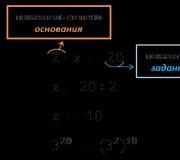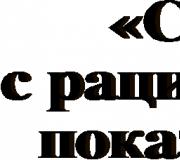Rock band polite refusal military verses. Polite refusal “Military couplets” (2017)
“War Couples” is a long-awaited program of “Polite Refusal”, which has been incubated for at least nine years. Work on the previous album “Geese-Swans”, which was released in 2010, had just begun, and Roman Suslov was already talking about how in the summer of 2008, “wiping his butt in the saddle, being a shepherd of his own horses,” he composed a cycle of songs that were intended as “one big coherent work,” a suite called “Six Songs about War.”
One of the songs that was eventually included in “Military Verses,” “We Will Win,” was first recorded in the studio simultaneously with “Murka,” a number from “Geese-Swans.” Three more numbers that eventually settled on “Geese” - “March”, “Time” and “Tikireka” - were originally conceived as fragments of a military program. "March", however, still opens the military program at concerts. In 2011, the public heard the “military” “Overture” (thus, there were two “Overtures” in the “Refusal” repertoire - the first was released on the album “Ethnic Experiences”; it is interesting that in both cases the overtures do not open the albums at all, but, on the contrary, occupy penultimate, seventh place), as well as the work “History”, which was later abandoned by the group. The following year, two more issues appeared - “What if!” and “Guderian and Ice Cream” (however, in the version of the title at that time, instead of Guderian, there was another general of Hitler’s army - Rommel). The program was finally assembled by 2016.
The theme of war is by no means new for Refusal. It all started with the words “machine gunner, line” in the song “Hey!” "classical" period, now transformed into "Scribbling on the tower, machine gun" into "We will win." After this, the war appeared here and there, sometimes clearly, sometimes not very much. different works groups. This theme was especially clearly manifested in the diptych from the album “Geranium”, dedicated to civil war. Explaining the choice of topic at early stage formation of the program, Suslov said ironically in one of his interviews: “We don’t know how to do anything other than fight. Such an old Russian pastime.”
In “Military Verses” the war is not hidden anywhere, it is read in the titles of the numbers, and in the (rare) texts, and in some musical techniques - in any case, certain fragments can be taken as attempts to convey shots or turns of military aircraft. Of course, it is not clear when this war is going on and with whom. The general's surname, the images of an anti-aircraft gunner, an artilleryman, a tanker and a battalion commander are reminiscent of the relatively recent past. But judging by the context in which these seemingly real images are placed, one should come to the conclusion that the war is allegorical in nature, and images or cliches are used simply because they are familiar from childhood.
Sun Tzu said: war is a great thing for the state, it is the ground of life and death, it is the path of existence and death. This needs to be understood.
I won't be mistaken if I say new album The long-awaited “polite refusal” I've been waiting for it for about six years - from the very moment I first heard one of the tracks that was ultimately included in it at a concert. And indeed: a year later the name “Military Couplet” was announced. It wandered from mouth to mouth, without being realized in any way. Meanwhile, the element to which the new release is dedicated was walking ever closer, approaching the borders of the territory that we consider our Motherland, and every time I came to “Otkazka,” I heard its howl in lines from various songs of the group: from “machine gunner, lines " before " best friend a soldier is a black raven." At the same time, it was clear that the theme was not being emphasized at all, it was just that the bifurcation point was there. How could it be otherwise if back in the 4th century BC. Sun Bin (and not Sun Tzu, his distant ancestor, as was previously believed) expressed the idea with which the most famous treatise on military strategy and politics begins?
You might think that since the album is called “War Verses”, then it is about war. And observers note that this “theme” has previously surfaced more than once in the compositions of the Moscow avant-garde/psychedelic group. But then you have to assume that the song “Hey, Blacksmith” is about a blacksmith. And “Wardrobe” is about a closet? It is clear that this is not entirely true. For “Refusal,” war, like the closet, is a symbol, an allegory. “The spirit of the people is strong while the war is going on!” – Does anyone think this is funny? “We will win, there is no market, in the next war!” - who didn’t recognize this intonation, familiar to every school, every yard?
The release took a long time to prepare, things from it were presented at concerts, something fell out of the series and was released on the previous album “Geese-Swans” (2010). And yet “Military Verses” is a complete album, it creates a single field of meaning, it is a suite. Hysterically joyful horns open the album with stumbling bravura. New/old/familiar names appeared in the lineup - saxophonist Pavel Tonkovid joined the ranks of the brass section with Andrei Solovyov (trumpet), the keyboards were played either by Pavel Karmanov or by Maxim Trefan, a participant in the early recordings of “Okaz”.
The song “What if!” goes into musical abstraction, the Morse code at the beginning of the song “Guderian and Ice Cream” is replaced by the vocals of Roman Suslov, screaming under the riff of the winds and stormy drums of Mikhail Mitin: “On the left!”, “Flank!”. The growls of Dmitry Shumilov's bass, meanwhile, seem to be an imitation of tank tracks. At the beginning of the theme “Infantry in the Trenches,” Suslov’s jazzy guitar is tempting, as if we are around a fire. Sergei Ryzhenko’s café violin and quasi-romantic melody create a surreal mood that collapses into brass mayhem. Next is “Gopak”, a crouching brutal dance with shouting and whistling. The “anti-aircraft gunner” shouts “I must know EVERYTHING!!!”, literally sparkling a rainbow of meanings embedded in the text. The tricky translation of the name - “Sky Shooter” makes you smile, parsing it leads to the word “zenith”, but this is not football club, and a point in the sky is not a target? "We will win!" - assures the explosive apotheosis.
The functions of the overture are performed by the first song, and the composition “Overture” turns out to be the penultimate item on the track list. The words are over - a stream of phonemes sounds. After this, you don’t even want to guess what the group called the word “Final” - the last composition. But the restrained guitar of Suslov and the bells of Denis Yurovsky sound, it turns out pure feeling, when words are no longer needed, but you can hug and listen. But this thing is short.
The philosophical irony of “Polite Refusal” is reflected in the ideally mocking, laconic and mysterious cover of the album and in the approach to its painful, difficult topic. But the public did not realize that before their eyes a creative experiment was unfolding in the spirit of a long-formulated trend - “the profanation of totalitarian heroism.” The album cannot be called a psychoanalysis of human aggressiveness. The group doesn’t seem to be striving for a state of catharsis. The team is simply “fighting”, or rather, disagreeing with the vulgar understanding of important things. And this war is eternal, although we, of course, will win...
Conversations that “Polite Refusal” will soon have a cycle of songs about the war began a long time ago, and Roman Suslov himself admitted that he began composing these songs in the summer of 2008, “wiping his butt in the saddle, being a shepherd of his own horses.”
One of the songs, “We Will Win,” was first recorded in the studio simultaneously with a number from the album “Geese-Swans.” Several works, which were originally conceived as part of the “military program”, eventually became firmly part of the “Geese” program and were published on the corresponding album. However, gradually the “military” program itself began to come together, songs one after another, not quickly, but confidently, took their place in the group’s repertoire.
The theme of war is by no means new for Refusal. It all started with the words “machine gunner, line” in the song “Hey!” “classical” period, and was especially clearly manifested in the diptych from the album “Geranium”, dedicated to the civil war. The current program evokes associations, perhaps, first of all, with the song “Waltz”, as well as the “Epigraph” that preceded it on the record “ And-and times!..”, where the war is spoken about directly and sung indirectly. I also remember the video for the song “Fire of Moscow 1812”, where armies from different eras and varying degrees of reality.
In “Military Verses” the war is not hidden anywhere, it is read in the titles of the numbers, and in the (rare) texts, and in some musical techniques - in any case, certain fragments can well be mistaken for attempts to convey shots or turns of military aircraft. Of course, it is not clear when this war is going on and with whom. Maybe this is some kind of recent past - the title of one work includes the name of a general in Hitler’s army, another is called “Anti-Gunner,” and the third mentions an artilleryman, a tankman and a battalion commander. But rather, this is an allegorical war, and images are used simply because they are familiar from childhood.
Musically, “Refusal” seems to move simultaneously towards complexity and simplification. If the program “Geese-Swans” with its complex rhythms, multi-level, poly-stylistics seemed, especially at first acquaintances, to be a huge leap upward compared to all the previous work of the group (already quite rich and intricate), then “Military Verses” rose even higher “ Geese." It seems that this is the most musical program of all the Otkazov programs (which is not surprising, especially considering that there are more permanent musicians on this album than ever before). In the abundance of moves, themes, wrapped passages, improvisations, sometimes you begin to get bogged down. And at the same time, if the songs from “Geese” are quite difficult to sing, here, on the contrary, there are quite a lot of memorable and quite easy to perceive and assimilate melodies. And we’re not just talking about “We will win” - probably the most simple, deliberately, although, perhaps, deceptively poster song of “Refusal”. Even in the most complex “military” compositions, where guitar chromaticisms, splashes of piano, sudden attacks of drums, screaming trumpets, howling saxophones and piercing violin solos are intertwined into a ball, a motive suddenly appears, piercing in its sad clarity.
War is, first of all, confrontation. And his group manages to convey it unusually convincingly. Perhaps the main one musical technique, which is used in War Songs, is layering. From time to time we hear how a topic breaks through someone's noise, someone's attack. And sometimes there are two topics at once that don’t seem to fit in with each other. Or one tune appears across another.
And most importantly: the group continues to move in the directions set by “Military Verses”. “Romances” are already breathing down the back of the “Couplets” head - completely new program, gathered by late Otkazov standards, very quickly.




